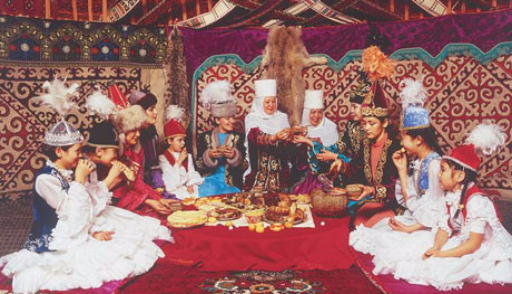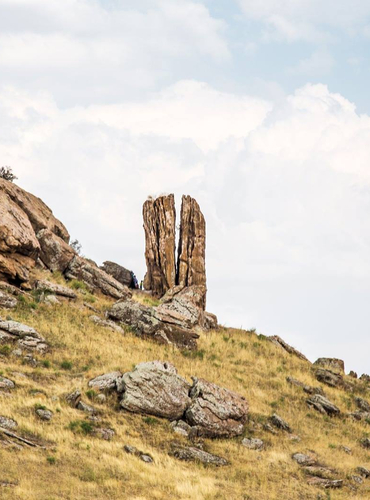+7 (700) 4 999 200
+7 (775) 056 02 26

Tugan zherge aunatu - according to the custom, a man who lived a long time, far away from their homes, to return to their homeland should roll in the ground. Briefly meaning of this action can be attributed to the following proverb - "we are all children of his native land."
Auzyna tukirtu - literally the name of this ritual translates as "spit in his mouth." The ancient Kazakhs there was a belief, according to which a drop of saliva, give the child a brave batyr, a popular speaker or akin to child enters a piece of the gene of the human talent. Due to this, in the future this child will have good luck.
Ashamayga mingizu - ritual, according to which the 6-7-year-old boy was supposed to give his horse and whip. This ritual is a kind of "initiation", having proclaimed that the child jigit. On this day, we bless the elderly young rider on feats of arms. After that, parents staged in honor of the son of a small (holiday).
Bastangy - an ancient analogue of modern youth parties. Traditionally, these celebrations were held immediately after the departure of adults. During bastangy guests, how to plant, expressed only one wish - to travelers on the road accompanied by luck and not caught the disease.
The Kazakhs on adat - marriage between relatives up to the seventh generation is forbidden, like a taboo, it helps to prevent blood-related mix-and as a result - a positive impact on the future health of offspring.
In addition, there was a judgment in the past, that early marriages contribute to the retention of youth from indecent acts and are prerequisites for the birth of healthy children. So the girls were married off at 13 - 14 years. Today, however, the tradition of early marriage is not practiced in Kazakhstan.
Any wedding ceremony anticipates құdalyқ (matchmaking) in Kazakh society. On the eve of the wedding the bride's house come to matchmakers. Their task - to negotiate with the closest relatives of the girl about her marriage. During courtship, the bride's father receives gifts from the guests, is a kind of deposit.
If negotiations are successful, the father, in turn, presents the main matchmaker bathrobe. This custom is called "Shege shapan". Preparation "құyryқ bauyr" dish of liver and fat of sheep, also testifies to the successful completion of matchmaking.
The next stage of the festival - seeing the bride 'Kyz ұzatu ". In the evening before the ceremony in the girl's house again come to matchmakers. The number of visitors should be even (5-7). Early in the morning, the bride with matchmakers are sent to the groom's house. Farewell procedure followed by the ritual execution of Kazakh song "Jar-Jar."
A solemn rite bride meetings referred kelіn tүsіru. The main element kelіn tүsіru is the fulfillment of the traditional songs of instructions and suggestions - "Betashar".
In ancient times, when the Kazakhs have practiced nomadic way of life, the newlyweds accommodation (yurt), was located behind the groom's parents' home. According to tradition, the first threshold yurt had to cross the bride, and always do it with the right foot.
Also during the wedding ceremony, the couple should work together to drink a jar with water, which dissolved sugar and salt. By giving, this ritual - the guarantor of a happy family life.
No less interesting in the complex events of wedding ritual unwinding bride braids, followed by a split. Two braids on the head of the bride, symbolizing the end of loneliness and the beginning of married life.
Shіldehana- celebration associated with childbirth.
Besіkke fat, Besik that - feast hosted after placing the newborn in the cradle. As a rule, organized on 3-5 day after falling off the umbilical cord of the baby.
Esіm koyu, am қoyu- naming ritual. It can be carried out in the framework of the festival shіldehana or during the celebrations dedicated to the laying of the newborn in the cradle. Rite Version charge most respected people, who among other things, bless the baby.
Kyrkynan shygaru - ritual, performed on the fortieth day after the birth. Includes: Bathing the baby in the 40 spoons of water, as well as the first cut hair and nails.
Tusa kesu- the Kazakh custom, on the day when the child made his first steps into the tent invited the oldest and most respected man in the village. He had a knife to cut a special rope, entangle the child's legs (cutting a put). This was done to ensure that in future the baby could walk nicely and run fast.
Sүndetke otyrғyzu - circumcision. The ritual is performed when the child is 5-7 years. On this day, parents call the yurt a mullah, who conducts the procedure. During that Mulla received a generous reward. Sometimes sүndetke otyrғyzu, organized a big celebration, which invited all the relatives and friends. It came on the make generous gifts hero of the occasion and his parents.

South Kazakhstan is the epicenter of architectural monuments of antiquity. This is where the Kazakh part of the Great Silk Roard begins.
Important historical events in the history of the state and the Kazakh people have been preserverd to this day in the form of cultural and hisori ...
South Kazakhstan is the epicenter of architectural monuments of antiquity. This is where the Kazakh part of the Great Silk Roard begins.
Important historical events in the history of ...